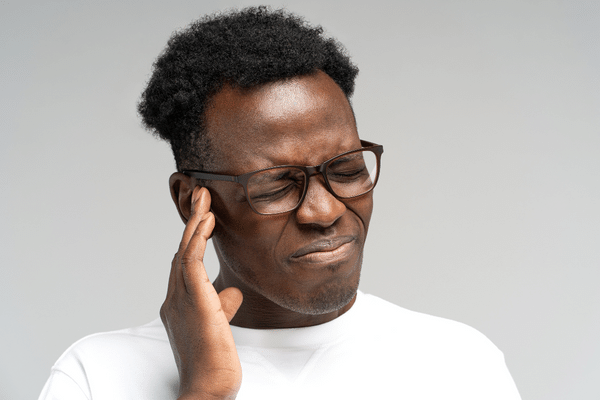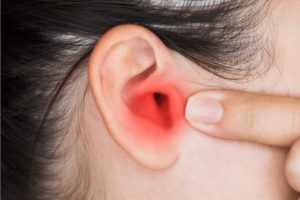Why Do My Ears Feel Full and Pressured?

If you’ve ever had the feeling of your ears being full or felt like your hearing is not as good as it normally is, your dizziness and loss of balance could soon follow. It can be fairly uncomfortable to deal with the lack of hearing, and balance but add the dizziness, nausea, and constant ringing in the ears that many experience each day and it can quickly become unbearable.
What is the cause of this pressure and full feeling? Better yet, how do you get rid of it? What is happening when you have these feelings and symptoms, and is it an emergency where treatment should be sought after immediately?
Blocked Eustachian Tubes
Increased ear pressure is the result of a blocked or non-functioning eustachian tube(s). Eustachian tubes are small tubes that run from the back of the nose and follow all the way to the middle ear. When these two tubes are blocked or not working right, pain and increased pressure, as well as lack of hearing or muffled hearing can happen quite quickly.
Many people don’t know realize that these tubes help balance air pressure on each side of their eardrum as well. When your eustachian tubes aren’t working right air pressure cannot be released through yawning swallowing, etc. as normal, creating uncomfortable ear pressure. It’s amazing what such a small tube does for us each day!
Causes of Increased Ear Pressure
Getting to know some of the causes of increased air pressure can help you and your doctor know how to treat your symptoms as well as the cause of your symptoms. Some of these causes of increased ear pressure may include:
1. Ear infections – Ear infections can be caused by all kinds of things. Maybe you’ve had a cold and a lot of congestion and your eustachian tubes have become blocked and then infected. Swimmer’s ear, a fungal infection, or more could all result in feeling added pressure in your ears too. Ear infections are often painful and added pressure is felt when lying down or at a higher elevation.
Depending on the cause of your ear infection, you may be prescribed antibiotics by your doctor or antifungal ear drops. You will probably be told to rest and to take acetaminophen or ibuprofen to help with the pain until the other medications can fully take effect.
2. Sinus problems – Having a cold or allergies where increased mucus is produced can create sinus congestion, headaches, ear pressure, and even toothaches. While we will all experience this kind of thing from time to time, it’s still a nuisance and can put us in bed for days.
The best treatment for a cold is lots of rest, saline nasal washes, or saline spray, using a humidifier to increase moisture, and taking a decongestant. If you find that you’re not getting better after a few days, visiting the doctor to treat a possible sinus infection with prescribed antibiotics is in your best interest.
If its allergies causing you grief, talk to your doctor about the best treatment or try an over-the-counter allergy medication for relief.
3. Earwax Buildup – Some people produce more earwax than others. Anyone can develop a buildup of earwax though, and it can eventually cause a blockage against your eardrum. This blockage can affect your hearing as well as make you feel as though your ears are full and uncomfortable. Some even experience ear discharge and itching as well.
Don’t hesitate to go see your doctor about possible ear wax buildup. They can help with most blockages by removing much or all the earwax causing you problems. Your doctor may tell you to use over the counter eardrops as well as prescribe an antibiotic if there is an infection found as well.
4. Altitude changes – If you experience a change in altitude, for instance as you head up into the mountains with your family over the weekend or fly in a plane, your body may be unable to equalize that pressure quickly enough. When this happens, you will probably feel added pressure and/or pain, and notice that you can’t hear quite as well when someone talks to you.
Luckily, for the most part, you can treat this one yourself by simply yawning, swallowing, or even chomping on a piece of gum to help release some of that pressure. It’s a quick fix and should notice immediate relief.
5. Meniere’s disease – This condition causes a buildup of fluid in your inner ear. The same feelings we have been talking about like added pressure as well as dizziness and ringing in your ears are the result.
Although we are not sure why Meniere’s disease occurs, the symptoms are treated with diuretic pills to get rid of excess fluids and anti-vertigo medications.
6. Foreign objects – You may experience pain and pressure if a foreign object has been lodged into your ear. There could also be a cyst creating a blockage and giving you the same symptoms.
Both issues need to be seen by your doctor for removal and follow-up treatment to avoid any infection.
When You Need to See Your Doctor
Ear pain is not something you want to simply endure, especially in children. If your child is experiencing congestion and added ear pain for a couple days or more, they may have an infection that can be treated with a simple antibiotic.
If you are experiencing added ear pressure, pain, dizziness, and problems balancing that are not relieved with OTC treatments and a few days of rest, make an appointment with your doctor. Your physician will be able to rule out infections, wax buildup, remove foreign objects as well as talk through your symptoms to better diagnose the cause.
The team at Fairfax Hearing Center can help as well. Providing services such as ear wax removal, hearing tests, Tinnitus (ringing in the ears) management and more. Contact our team at Fairfax Hearing Center to find out more about our services, our team, and to schedule a consultation and hearing test today.

